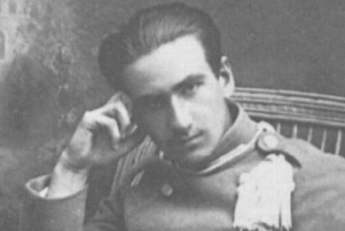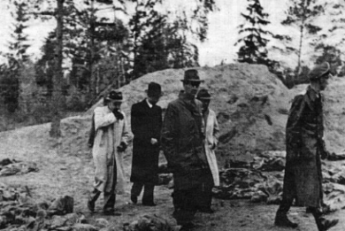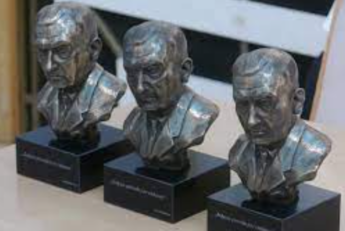
The last interview of Józef Mackiewicz
There must always be the last interview. Human life is not eternal and everyone understands this, especially it becomes obvious at the end of life. It is also conducive to broader reflections or even a deeper look at reality. So what was Józef Mackiewicz’s last interview like?
The first question that a journalist, in this case Jacek Żuralski (Marek Nowicki) asks Józef Mackiewicz, is a question about his health. The writer emphasizes that it is terrible, and considers it a “privilege” of his age – no wonder, in 1984 he was already over 80 years old.
Another question concerns the circulation of books, the languages in which they were published. Mackiewicz gives an exhaustive answer to this question, interestingly, he points out why they did not become bestsellers: “Pacifism, faith in “dialogues” … – neither me nor my books fit into this.” As a paradox, he recalls the history of his book about Katyn, published for the first time in Switzerland, in Zurich, in 1949. The circulation of 10,000 copies, which is large for Switzerland, was sold out. Since then, no German publishing house has been willing to reissue the book. “And it would seem that anyone, but the Germans, who are made the only criminals during the last war, should be interested in the truth about this grim crime of murdering Polish officers, prisoners of war, a crime that, by the way, the Bolsheviks tried to attribute to them,” he says. . As it turned out, the book easily found its way to English and American readers, but in order to reach German readers, it had to seek the mediation of the Russian immigrant publishing house “Possev”.
On the other hand, books in Polish, published in exile, became bestsellers. Almost all of them have been reissued.
Further conversation concerns the division of Mackiewicz’s work into fiction and historical journalism, and which part of writing is most valued by the author. Mackiewicz refers to the opinion of his wife Barbara Toporska – according to which novels describing “as faithfully as possible the attitudes and behavior of specific individuals and individual groups of people in the face of historical events” are more important. However, he himself emphasizes that he often stopped writing novels out of a sense of duty to “fight with the pen” on current, important issues. He notes that journalism does not necessarily have to become outdated. As an example, he gives his “The Victory of Provocation”, a book that is experiencing a renaissance of success after twenty few years after the first edition was published.
There is also a question about the existence of emigration literature and whether there is anything “that connects Gombrowicz, Miłosz and Mackiewicz”. Mackiewicz replies that “emigrant literature is free literature”, and an emigrant writer does not have to do anything, he has the right to deal with what interests him.
There is a question about “Solidarity” and therefore about the hope of overthrowing communism. It is clear from Mackiewicz’s statements that he hoped that the counter-revolutionary movement would develop, but he also feared that it would work the other way. As he said, “the existing “oppositions” in the Soviet Bloc, which disavowed counter-revolution, are actually in Moscow’s favor, since they work to improve communism, not to weaken communism … Internal shocks in the Soviet Bloc … if they slip out of hand. communist planners, can lead to the overthrow of communism.”
The journalist also asks about “Kontra” – a book published in 1957 which is telling the story of the Don Cossacks. Mackiewicz’s answer is short, but at the same time exhaustive. He gives the title of the German edition of Counterattack, that is, Crime on the Drava River, and emphasizes: “I was (at the scene of the crime) almost at the time it was committed.”
The last question is extremely interesting – it concerns the political awareness of the Polish intelligentsia, the re-evaluation of the attitude of Poles towards Germans, Jews and Ukrainians. Mackiewicz immediately adds that also the attitude of Poles towards Russians. He expresses the opinion that “the most important are the disastrous effects of replacing – not only in Poland, all over the world – replacing the notions of communism and the Soviet Union with Russia.” He emphasizes that the Russians are the most natural and most important potential ally in the fight against communist enslavement. He recalls: “It was Himmler who said: “This pig Vlasov, dare to say that we will not defeat the Soviet Union without the Russians.” History – as we know – answered Himmler: Stupid,” emphasizes Mackiewicz at the end of the interview.
Source:
https://www.salon24.pl/u/tysol/150863,eberhardt-ostatni-wywiad-mackiewicza






